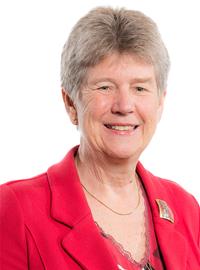The COVID-19 pandemic has highlighted the vital role science, technology, engineering and maths (STEM) play in the world today. Never before have STEM professionals been more in the public eye. I was recently asked in the Senedd “how the increased profile of female scientists during the pandemic can be used to increase participation?” The pandemic has been described as an opportune “Apollo moment” increasing the visibility, importance and appeal of science. By sharing stories of STEM female role models during the pandemic, we can inspire and motivate more girls and women to study STEM, setting them on a path to a rewarding career.
There are numerous examples of STEM female role models in Wales who have come to prominence during the COVID-19 pandemic. Here are some examples of their outstanding contributions and achievements.
Dr Catherine Moore, Dr Eleri Davies and Consultant Nurse Gail Lusardi from Public Health Wales received MBEs in the Queen’s Birthday Honours for their services to public health during the pandemic.
Dr Catherine Moore, a Consultant Clinical Scientist, led the effort to establish COVID-19 testing in Wales within a month of it being recognised as a new coronavirus. This resulted in the Public Health Wales microbiology laboratory at the University Hospital of Wales in Cardiff becoming the second in the UK to be able to test for the virus. Dr Moore recognised the significance of COVID-19 and secured early samples to study before any case had been reported in the UK. Working with colleagues, she helped ensure that Wales started sequencing the virus in early March – days after the first confirmed case in the country. This has resulted in Wales having submitted the third largest number of sequenced cases to a global database, providing information about the characteristics of COVID-19 and its spread.
Dr Eleri Davies is a Consultant Medical Microbiologist and interim Medical Director of Public Health Wales. During the pandemic, Eleri has been working closely with her Consultant Nurse colleague Gail Lusardi on the infection prevention and control measures needed to minimise the spread of COVID-19 within health and social care settings, but also more broadly. The work has been demanding, but also very interesting as they applied their knowledge and experience of infection prevention and control and microbiology across all settings. They have interacted and engaged with specialists, the Welsh Government and the population of Wales in support of minimising the spread of this infection.
Dr Ceri Lynch, consultant in Anaesthetics and Intensive Care at the Royal Glamorgan Hospital and critical care research lead, is another outstanding role model for women in clinical science. In intensive care, Ceri and her team have worked hard looking after the sickest of patients. “She has been simply outstanding in caring for patients with COVID-19 in the most difficult and challenging of circumstances.” Ceri has also spent time working on clinical trials to improve our knowledge about critical illness. Particularly interesting studies have included genetic testing to find out why some people have COVID-19 with no symptoms whilst others are seriously unwell or die. She has been investigating various drug treatments for COVID-19 and has found one that improves survival. Ceri has also explored the use of virtual reality to reduce pain, stress and anxiety in patients, relatives and hospital staff.
Professor Valerie O’Donnell at Cardiff University’s School of Medicine led an international evidence review which proposed that oral rinsing has a theoretical potential to reduce coronavirus transmission. The team tested the impact of mouthwash on the SARS-CoV2 virus under laboratory test tube conditions that mimicked a person’s throat. They found that certain types of mouthwash preparations inactivated coronavirus infectivity during a 30 second exposure. Similar findings have recently been presented by independent studies in at least three other laboratories around the world. A separate clinical trial being led by Cardiff University is now testing whether mouthwash can inactivate the virus in the mouth.
Dr Vijayalakshmi Varadarajan is a Consultant Anaesthetist at the Princess of Wales Hospital, Bridgend. At the start of COVID-19 pandemic she used her knowledge and skills to design a protocol for safe intubations for the MERIT (Mobile EndotRacheal Intubation Team). She actively demonstrated and taught the skill for performing intubations with minimum risk of AGP (Aerosol Generating Procedure) for the person doing the intubation. She personally trained both consultants and trainees in this safe technique. Despite being asked to shield during the pandemic by her medical consultant, she continued working at the Nuffield Health Hospital, anaesthetising urgent cancer cases.
Professor Awen Gallimore, an immunologist at Cardiff University’s School of Medicine, is a member of a UKRI-funded COVID-19 Immunology Consortium working to understand how the immune system responds during COVID-19. Her work is focussed on understanding the pathology of the disease; identifying patients most at risk from severe disease; assisting doctors in deciding treatments; the rapid development of vaccines; and novel treatments for severe COVID-19
Professor Kamila Hawthorne MBE is the Head of the Graduate Entry Medicine programme at Swansea University and a GP in Mountain Ash. When COVID-19 struck in March 2020, Kamila rallied her team to rapidly and dramatically change the medical student teaching to be delivered virtually. Kamila worked with Swansea Bay and Hywel Dda University Health Boards to set up volunteer posts for the students, many of whom were keen to help out with the crisis. Judging that the final year students were ready, they were allowed to graduate three months early in April 2020, so they could start working as junior doctors immediately. Throughout all of this, Kamila has continued to see and care for patients as part of her work as a front-line GP.
Dr Emma Hayhurst is a lead scientist on a project at the University of South Wales to develop a rapid test for COVID-19. The test is quick and portable, it doesn’t need to be processed in a lab and the results can be available in less than 30 minutes. There are so many possibilities for how this test can be used, for example, in care homes, hospitals, airports, dental labs and GP practices. The team have been awarded funding from the Welsh Government’s innovation department to validate the test. This could lead to it being available for use in early 2021.
Help keep news FREE for our readers
Supporting your local community newspaper/online news outlet is crucial now more than ever. If you believe in independent journalism, then consider making a valuable contribution by making a one-time or monthly donation. We operate in rural areas where providing unbiased news can be challenging. Read More About Supporting The West Wales Chronicle

























